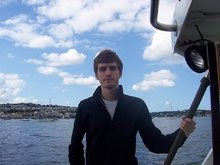 Xs marks the spot.
Xs marks the spot.One of my favourite all time Simpsons moments is when, and I forget why, someone is imagining pirates burying treasure. One, slightly foppish, pirate speaks up and says "Why are we burying the treasure, why don't we use it to buy things? Things we like." He's then shot but the lead pirate.
One of my other absolute favourite moments is when Homer visits a strange, edge-of-town car lot run by an eastern-European chap. Homer struggles to fit in the tiny, three-wheeled car as the sales man pronounces "It gets 400 hectares on a single tank of kerosene." Then, as Homer stalls the car and we see a shot of foreign symbols on the dashboard that might as well be Tetris pieces, the man shouts "Put it in H!" (I think you can watch all this here.)
One more: In the episode where Bart becomes the 'I Didn't Do It Boy' Homer is led to believe Bart has been crushed to death and turned into a box. We see him outside practicising various ways to break this news to Marge in that classic sitcom way that characters do. When Homer finally does break the news his exact words are: "Marge, I have some horrible, bone-chilling, news." Brilliant.
---
When I did Ten Tors training me and my 'tent' buddy used to keep our spirits up during the damp, boring nights in our cramp, uncomfortable tent by reciting our favourite Simpsons moments. Works well for other similar situations. Such a shame it had to jump the shark though.












